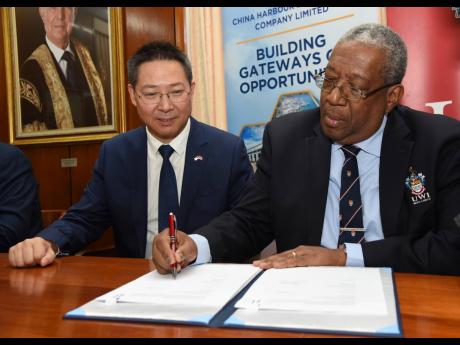Editorial | Bolster industry, learning institution partnerships
The announcement that China Harbour Engineering Company (CHEC) and The University of the West Indies (UWI) will jointly develop a civil engineering laboratory to service UWI Mona Western Jamaica Campus in Montego Bay reflects that kind of practical cooperation between industry and learning institutions, for which this newspaper has campaigned, that can help to drive Jamaica’s growth and economic development.
The development is also another indication of the kinds of projects in which the university can engage as it seeks to extricate itself from its economic problems.
The details of the cooperation between CHEC – a Chinese state-owned construction company that has large investments and has done major projects in Jamaica – and UWI Mona Western Jamaica Campus were not disclosed. It is, however, known that the laboratory will test construction materials for a US$274.5-million road skirting Montego Bay, in northwestern Jamaica, with Mona as an offshoot campus. The lab, which, presumably, will be fully handed over to the university at the end of the road project, will be used for the training of UWI students and staff.
Significantly, CHEC’s Jamaica Country Manager, Dangran Bi, said his company intends to “pass a considerable amount of our engineering expertise to students, local contractors and other interested persons, as we have consistently done within Jamaica and the countries where we operate”.
The difference in this case, though, is that the knowledge transfer to which Mr Dangran referred will be, in part, in a formal institutional setting where the information and/or data can be systemically collated and be available for wider transference via various technologies.
In this respect, even if the laboratory’s use will be in the broader field of civil engineering, its initial emphasis on assessing the quality of materials to be used on the Montego Bay perimeter road will hopefully lay the basis for improved road construction in Jamaica. Or put differently, the lab will be the embryo for a specialised training and research facility in road design, construction and maintenance.
Last year, 488 people died from road crashes in Jamaica. The authorities attribute the vast majority of these fatalities to speeding by motorists and, in many instances, motorcyclists riding without helmets, and the failure to use, or the improper use, of safety devices. What, however, is not recorded, which anecdotal evidence suggests is not an insignificant contributor to road crashes, and deaths and injuries therefrom, is the state of Jamaica’s roads.
Poor road quality might largely be the result of the Government’s inability to afford the maintenance of the surfaces, in accordance with use and lifecycle schedules. But there is also the claim that in too many instances, the roads deteriorate far more quickly than they ought to because of poor design and/or the use of inappropriate material.
A specialised road institute would not only train students in the engineering skills for road construction, but would be engaged in ongoing research on the latest road-building technologies, and their application to Jamaica and the Caribbean. Roads and the materials used to build them will be subject, in this research environment, to ongoing stress tests under various environmental conditions, within the Jamaican and regional context.
Against this background, and presuming that CHEC’s agreement with the UWI gives the company no priority rights over the laboratory and does not limit the university’s ability to engage in other partnerships, the facility might provide UWI with an opportunity to seek out and pursue profit-centred engineering and construction-related research and development arrangements with private-sector entities. Given the financing cuts by Caribbean governments to the UWI, this lab is, on the face of, a potential income-generating scheme.

